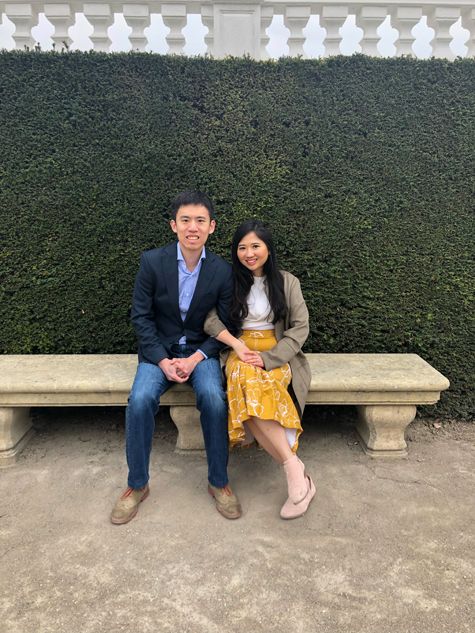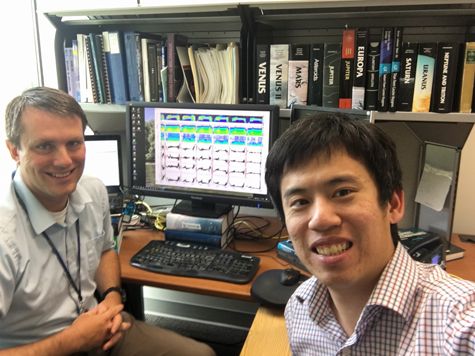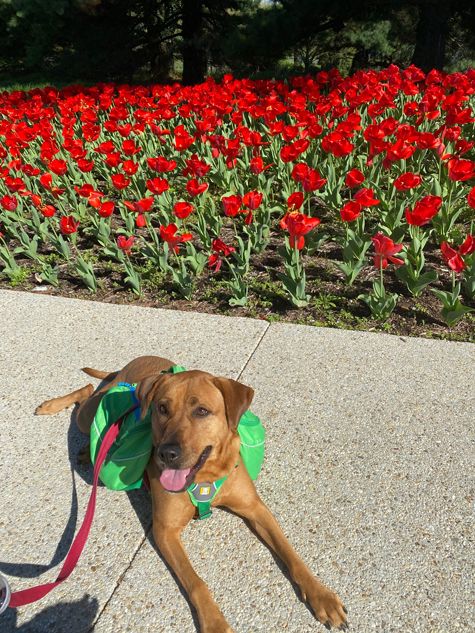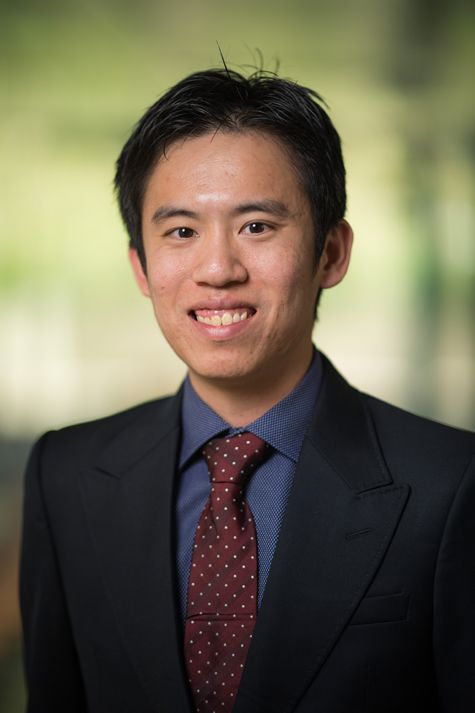Early Career Scientist Spotlight
Dr. Gang Kai Poh (he/him/his)
Space Physicist
Planetary Magnetospheres Laboratory (695)
Did you always know that you wanted to be a space physicist?
Not exactly. I recall that I was very fascinated with Cellular Biology when I first decided that I would like to grow up to be a scientist, but that interest in Biology was a fleeting moment. I quickly fell in love with Astronomy as a child when I saw a newspaper article about how Mars, at the time, was at its closest distance away from Earth. I even stayed up past my bedtime hoping to see a Mars that is as big as the Moon (of course that is NOT true). That was rather silly of me at 8 years old. But I made up my mind that I was going to pursue Astronomy as a career. I stuck by my aspiration despite many challenges and doubts, especially in South-East Asia where space was not a huge deal to many people in the early 2000s.
When I was studying Astronomy at University of Colorado (CU)-Boulder, I attended a seminar by Prof. Daniel Baker about Mercury and NASA’s MESSENGER (Mercury Surface, Space Environment, Geochemistry and Ranging) mission. Eventually, I secured a research position with Prof. Baker, which ultimately cemented my decision to choose Space Physics as my career. I would also add that having highly supportive mentors during my graduate school definitely helped make this career decision easier.

Credit: Gang Kai Poh
What skills are most useful to you in your work, and where did you develop those skills?
I was taught that the most important skill a scientist should learn is the ability to write successful proposals to seek funding for your research ideas. It is also a skill that was rarely taught in school. I have always considered myself to be lucky to be able to watch and learn from my PhD advisor about how to strategize research ideas and put together a set of compelling science questions/methodologies in a research proposal to maximize the chances of winning the grant. I have submitted multiple proposals with some level of success and rejections. With every rejection, I always strive to do better in the next round of proposals by re-evaluating my proposals according to the reviewers’ comments. I also volunteer to serve on review panels on a regular basis to keep myself updated on the current Research Opportunities in Space and Earth Sciences (ROSES) program requirements and review process – something that I highly recommend any early career researchers to participate in.
What do you enjoy the most about your job?
My job at NASA Goddard and the Center for Research and Exploration in Space Science & Technology (CRESSTII)/Catholic University of America (CUA) primarily involves the analysis of magnetic field and plasma measurements to study plasma processes occurring around Mars’, Earth’s and Mercury’s plasma environment. More recently, my work has expanded to include mentoring undergraduate students/interns on various research projects and teaching space weather courses at the Catholic University of America. Through my recent experience, I have come to realize that I actually very much enjoy the mentorship and teaching aspect of my job. It was kind of unexpected because I recall being very nervous about mentoring students and teaching a class. They don’t teach those skills in graduate school. But as I made mistakes and learned from them on the job, I find teaching and interacting with students a very positive and rewarding experience. It also helps when the students that I worked with are very patient and understanding! As I always share with others, as much as the students are learning plasma physics from me, I am also learning a great deal of knowledge from them through discussions and collaborations. I would highly recommend any early-careers who might be interested to start by participating as mentors in various internship opportunities that NASA Goddard and CRESSTII or the Partnership for Heliophysics and Space Environment Research (PHaSER) provide.
Tell us about the research projects you are currently working on.
I am currently working on three research projects, each for Mercury, Earth, and Mars.
For the Mercury project, I am currently working with an undergraduate student to analyze solar wind magnetic field measurements collected by the MESSENGER mission and to compare the solar wind data with the Alfvén Wave Solar atmosphere Model (AWSoM) developed by the University of Michigan. The goal of this project is to assess the capability and accuracy of the AWSoM model in predicting typical solar wind and extreme space weather conditions in the inner heliosphere.
For the Earth and Mars project, I analyze the magnetic field and plasma measurements from the Magnetospheric Multiscale Mission (MMS) and the Mars Atmosphere and Volatile Evolution Mission (MAVEN), respectively, to study the properties and occurrence of plasma waves in the solar wind region upstream of their respective planetary bow shocks. Specifically, I am characterizing the properties and growth of non-linear plasma waves (also known as “shocklets”) at Mars and “3-seconds waves” at Earth.

Credit: Gang Kai Poh
What is one space mission that you are particularly excited about, and why?
I am particularly excited about the upcoming European Space Agency (ESA)/Japan Aerospace Exploration Agency (JAXA) Bepi-Colombo mission to Mercury. I started my career with an undergraduate research project focused on Mercury in the Laboratory for Atmospheric and Space Physics (LASP) at CU-Boulder and, since then, Mercury has never stopped fascinating me. Even after 4 years of data collected by the MESSENGER mission and 7 years after MESSENGER crashed onto Mercury’s surface, we are still constantly learning new and exciting science about how Mercury’s small yet dynamic plasma environment interacts with the solar wind. Although MESSENGER has revolutionized our understanding of Mercury science, there are still so many things about Mercury that we do not fully understand. So, I am very excited about the new data, knowledge, and understanding that Bepi-Colombo will bring when it goes into orbit around Mercury in 2026.
What do you like to do in your free time?
Growing up in a multi-racial society where I am constantly exposed to cuisines from all over the world, being adventurous in tasting cuisines from different cultures has always been a big part of my life and this is something that I very much enjoy. The DC area is a big melting pot of global cultures and the global culinary scene here is just incredible, unlike other parts of U.S that I have lived in. Since moving here, my wife and I have made it a regular weekend activity, whenever we have some free time, to try a different restaurant around the DC area while rotating between the different culinary regions of the world.
Whenever I have some free time to myself, I also like to “Netflix and Chill” with my family on the couch, catching up with the latest exciting shows and movies on streaming channels with my 6-year-old pup Artemis cuddling next to us.

Credit: Gang Kai Poh
If you were to expand your current research focus, what new topics would you explore?
I have always enjoyed the process of “learning new things” in any research project. As such, I am always on the lookout for new opportunities to expand my research interests into a new sub-discipline or research topic. Recently, I started two research projects that seek to understand ultra-low frequency waves in the plasma environment of terrestrial planets, which is a totally new research topic that is outside of my expertise and research experience. Although the fundamental physics are the same everywhere, the study of plasma waves in space environments requires a significantly different level of understanding of plasma physics and analysis techniques. There is definitely a steep learning curve for me. I had to refresh my basic knowledge of plasma waves taught in school while reading up on the current literature and analysis techniques. However, I often find the process of going outside of my comfort zone to explore new knowledge very rewarding, especially at that “Eureka!” moment when I finally grasp a new concept or idea.
Another new research topic that I hope to explore would be plasma processes at the outer planets. For instance, with the amazing data collected by the current Juno mission, I think that there is so much to learn about the different plasma processes occurring within Jupiter’s giant magnetosphere. I also find the Neptunian and Uranian systems fascinating and hope to explore these unknown systems further, despite our limited observations from the Voyager mission.
Biography
Home Town:
Singapore
Undergraduate Degree:
B.A. in Physics and Astronomy, University of Colorado Boulder, Boulder, Colorado
Post-graduate Degrees:
M.Sc in Atmospheric, Oceanic and Space Sciences, University of Michigan, Ann Arbor, Michigan
Graduate Certificate in Plasma Science and Engineering, University of Michigan, Ann Arbor, Michigan
Ph.D in Climate, and Space Science and Engineering, University of Michigan, Ann Arbor, Michigan

